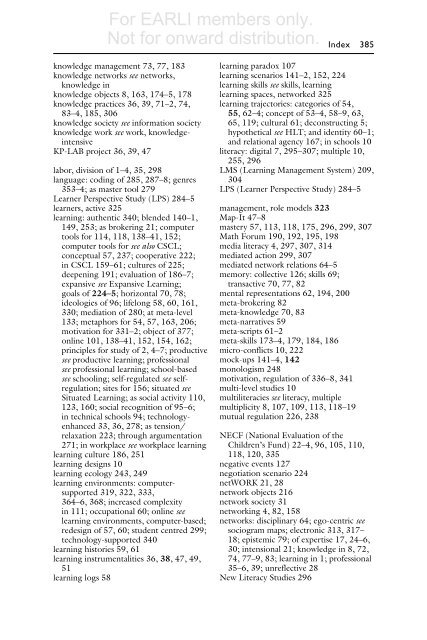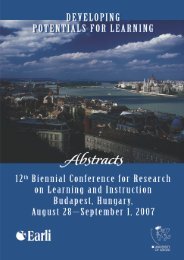Learning Across Sites: New tools, infrastructures and practices - Earli
Learning Across Sites: New tools, infrastructures and practices - Earli
Learning Across Sites: New tools, infrastructures and practices - Earli
Create successful ePaper yourself
Turn your PDF publications into a flip-book with our unique Google optimized e-Paper software.
For EARLI members only.<br />
Not for onward distribution. Index 385<br />
knowledge management 73, 77, 183<br />
knowledge networks see networks,<br />
knowledge in<br />
knowledge objects 8, 163, 174–5, 178<br />
knowledge <strong>practices</strong> 36, 39, 71–2, 74,<br />
83–4, 185, 306<br />
knowledge society see information society<br />
knowledge work see work, knowledgeintensive<br />
KP-LAB project 36, 39, 47<br />
labor, division of 1–4, 35, 298<br />
language: coding of 285, 287–8; genres<br />
353–4; as master tool 279<br />
Learner Perspective Study (LPS) 284–5<br />
learners, active 325<br />
learning: authentic 340; blended 140–1,<br />
149, 253; as brokering 21; computer<br />
<strong>tools</strong> for 114, 118, 138–41, 152;<br />
computer <strong>tools</strong> for see also CSCL;<br />
conceptual 57, 237; cooperative 222;<br />
in CSCL 159–61; cultures of 225;<br />
deepening 191; evaluation of 186–7;<br />
expansive see Expansive <strong>Learning</strong>;<br />
goals of 224–5; horizontal 70, 78;<br />
ideologies of 96; lifelong 58, 60, 161,<br />
330; mediation of 280; at meta-level<br />
133; metaphors for 54, 57, 163, 206;<br />
motivation for 331–2; object of 377;<br />
online 101, 138–41, 152, 154, 162;<br />
principles for study of 2, 4–7; productive<br />
see productive learning; professional<br />
see professional learning; school-based<br />
see schooling; self-regulated see selfregulation;<br />
sites for 156; situated see<br />
Situated <strong>Learning</strong>; as social activity 110,<br />
123, 160; social recognition of 95–6;<br />
in technical schools 94; technologyenhanced<br />
33, 36, 278; as tension/<br />
relaxation 223; through argumentation<br />
271; in workplace see workplace learning<br />
learning culture 186, 251<br />
learning designs 10<br />
learning ecology 243, 249<br />
learning environments: computersupported<br />
319, 322, 333,<br />
364–6, 368; increased complexity<br />
in 111; occupational 60; online see<br />
learning environments, computer-based;<br />
redesign of 57, 60; student centred 299;<br />
technology-supported 340<br />
learning histories 59, 61<br />
learning instrumentalities 36, 38, 47, 49,<br />
51<br />
learning logs 58<br />
learning paradox 107<br />
learning scenarios 141–2, 152, 224<br />
learning skills see skills, learning<br />
learning spaces, networked 325<br />
learning trajectories: categories of 54,<br />
55, 62–4; concept of 53–4, 58–9, 63,<br />
65, 119; cultural 61; deconstructing 5;<br />
hypothetical see HLT; <strong>and</strong> identity 60–1;<br />
<strong>and</strong> relational agency 167; in schools 10<br />
literacy: digital 7, 295–307; multiple 10,<br />
255, 296<br />
LMS (<strong>Learning</strong> Management System) 209,<br />
304<br />
LPS (Learner Perspective Study) 284–5<br />
management, role models 323<br />
Map-It 47–8<br />
mastery 57, 113, 118, 175, 296, 299, 307<br />
Math Forum 190, 192, 195, 198<br />
media literacy 4, 297, 307, 314<br />
mediated action 299, 307<br />
mediated network relations 64–5<br />
memory: collective 126; skills 69;<br />
transactive 70, 77, 82<br />
mental representations 62, 194, 200<br />
meta-brokering 82<br />
meta-knowledge 70, 83<br />
meta-narratives 59<br />
meta-scripts 61–2<br />
meta-skills 173–4, 179, 184, 186<br />
micro-conflicts 10, 222<br />
mock-ups 141–4, 142<br />
monologism 248<br />
motivation, regulation of 336–8, 341<br />
multi-level studies 10<br />
multiliteracies see literacy, multiple<br />
multiplicity 8, 107, 109, 113, 118–19<br />
mutual regulation 226, 238<br />
NECF (National Evaluation of the<br />
Children’s Fund) 22–4, 96, 105, 110,<br />
118, 120, 335<br />
negative events 127<br />
negotiation scenario 224<br />
netWORK 21, 28<br />
network objects 216<br />
network society 31<br />
networking 4, 82, 158<br />
networks: disciplinary 64; ego-centric see<br />
sociogram maps; electronic 313, 317–<br />
18; epistemic 79; of expertise 17, 24–6,<br />
30; intensional 21; knowledge in 8, 72,<br />
74, 77–9, 83; learning in 1; professional<br />
35–6, 39; unreflective 28<br />
<strong>New</strong> Literacy Studies 296
















